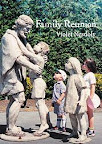
Title: The Cure
Author: Athol Dickson
Publisher: Bethany House, 2007
Genre: Fiction / Suspense
ISBN: 0764201639
When Riley Keep makes the long trek from Florida to Dublin Maine with fellow wino Brice on his back, his conscious motivation is to find, for his friend, the alcoholism cure that’s rumored to be available there. On a subconscious level, though, he’s surely seeking a lot more by coming home. When the cure works on him and he no longer needs to obsess on where he’ll find his next drink, he discovers that his estranged wife Hope is now the mayor and his teenaged daughter likes the lobster fisherman that’s been hanging around Hope better than she likes him. The Cure, Athol Dickson’s second novel, is the story of Riley’s challenge to live life, weighted as it is by former tragedy and guilt, without the aid of the booze that has cushioned him for the last few years. It is a twisty tale of addiction, deception, guilt, greed, cowardice, murder, courage, redemption and the possibility of new beginnings.
The Cure’s main characters are many-layered. Facets of Riley’s and Hope’s characters are revealed through the soul-searching they do in response to story events. (I must admit, though, that Riley’s persistent naïvete – he had been, in another life, an educated and wordly man – did stretch believability at times.) Willa, the keeper of the homeless shelter, is another interesting and mysterious player. Minor characters are not as well rounded, but still interesting and true enough to life to raise reactions like respect (Dylan), disgust (Bill Hightower) and fear (Lee Hanks).
The story’s setting is as bleak and brooding as that in Dickson’s first novel River Rising. There are moments of relief but mostly the grey colors and cold temperatures that greet our homeless alkies when they get to Dublin are reinforced by the growing suspicion and animosity of the townspeople. The clammy winter fogs give way at the book’s climax to a smoky and terrifying conflagration. It all serves to underline the story’s serious subject matter.
Dickson’s skill in plotting was a highlight for me. In that department he demands the reader’s attention as he throws out snippets of information via the various characters’ memories, which one then has to hold onto until more is revealed. Even in this he is cagey. For though we are privy to the thoughts of Riley, Hope and Willa, each seems to be avoiding or suppressing the details of some awful past event. This builds up the reader’s curiosity and increasingly overshadows the story with tragic mystery. The arrival of ever more homeless people in town and the gradually tightening noose of interests competing for control of the cure heighten suspense. Everything untangles at the end. But even there Dickson doesn’t opt for the obvious. It makes for a satisfyingly complex tale with its fair share of surprises.
Dickson’s writing was another of the book’s treats. He cuts straight to the action in efficient prose that never gets in the way of making the reader feel part of the scene. His ability to zoom in on key moments with precise description reminded me of macro-photography. Here, for example, is a bit from early in the story:
“Eagerly he pulled the bottle from the sack. It was full, the seal unbroken, its contents golden like the sunrise but much more beautiful, a complete quart of the finest single-malt Scotch whiskey. He held it a few inches from his face, squinting without his long-lost eyeglasses, recognizing the label from when he was a college professor with a wife and daughter, and his friend Brice was a plumber and they could both afford such things, and he pulled away the cap (it had a cork!) and thrust the bottle to his lips and took the Scotch into himself.”
At the same time he has entered deeply enough into the psyche of his main characters that he is able to plumb the psychological impact of the story’s happenings on them. The result is a thoughtful, sometimes philosophical commentary on a range of themes from addiction to the human condition:
“But could he do that without drinking? He had no model for a life like that, no example of the possibility, no system to avoid the awful truth about himself….Sober or not, nothing really changed, and if honor, life, and freedom could not coexist on either side of his addiction, then they must not really exist at all.”
For a frighteningly real walk in the shoes of an addict, The Cure is hard to match. But it is also a story of hope in the way it shows that not only can the chains of addiction be broken, but the dilemma of how to again fill a life separated from the companionship of alcohol can be faced with divine help: “…crosses to be lifted and carried, and follow me, and follow me.”
For a gripping, thoughtful, and worthwhile read, Athol Dickson’s The Cure is not to be missed.
Faithful Reader interview of Athol Dickson about the writing of this book.
Infuze interview of A.D. - about the craft of fiction-writing.
Sample: Chapter 1
Athol Dickson's blog

0 comments:
Post a Comment